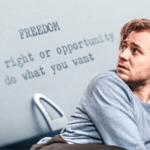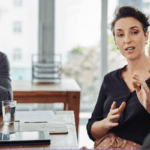“An optimist is a person who sees only the lights in the picture, whereas a pessimist sees only the shadows. An idealist, however, is one who sees the light and the shadows, but in addition sees something else: the possibility of changing the picture, of making the lights prevail over the shadows.”
– Felix Adler
We give and receive negative behavior based in fear and doubt every day. That’s part of our humanness. Being an idealist in the face of this behavior doesn’t mean we act as if we’ve had a lobotomy or bury our heads in the sand. Being spiritual and life affirming also doesn’t mean we turn a blind eye to injustice and condone or tolerate a lack of ethical treatment where negative effects are set in motion. When we observe or experience these effects, we can all say with accuracy, “That’s reality.” That’s the gift of the realist – recognizing our human frailties. The gift of the idealist is to remind us that we’re not human alone.
Recently someone provided a challenge to me. How can an idealist like me, help a realist, like him? He seeks to be positive, spiritual and life-affirming even as he experiences unfair, unethical and financially destructive treatment in his workplace. As a realist, he values his ability to define the tough “realities” of life – the facts, figures and circumstances.
So, I asked him if being factually correct was all that helpful and if he could be sure that anyone’s idea of reality is objective. I suggested that reality is colored by the stories and interpretations each of us brings as an observer. These interpretations, along with the physical and emotional responses we experience when witnessing an event, coupled with the resulting decisions we make about ourselves, others and life, all color our view of the event and our reactions to many situations thereafter. Our own subjective view or private logic can become a trap, providing an endless parade of limiting thoughts that can paralyze and debilitate us, increasing our discouragement and sense of powerlessness.
When he asked, “What can I do?” I reminded him that all suffering comes from our subjective beliefs and our attachment to them. We maintain limiting beliefs such as “this shouldn’t be happening” or “they shouldn’t do that” or “I have no power or choice” or in the case of the idealist, sugar-coated limiting beliefs, such as “this will work itself out if I just think positive thoughts.” We must recognize thoughts of fear and doubt, whether we think them through a relatively idealistic or realistic filter. We must also recognize that anything we do from fear and doubt, including what we think, say and do, has effects that reflect our fear and doubt.
The challenge for this man, as well as for each of us, is making a conscious choice to leave the comfort of known limiting beliefs; those thoughts and ideas that are familiar, yet lead to more of the same negative effects. Despite significant pain, we often resist choosing something new. Effort and intention are needed to consciously make new decisions in each moment to shift us away from fear and doubt toward faith and grace. We avoid painful physical and emotional feelings, but then end up thinking, saying, and doing things that further support worry, pain, anxiety and stress.
If we wish to be powerful and effective during challenging experiences, we must tap into the spiritual, psychological, emotional, intellectual and social resources available to us that are focused on moving us toward a state of grace. There are many such paths and they all start with faith in a power beyond the human. It’s also a faith in the intelligence and heart of others who have learned powerful lessons and are currently writing and teaching us how to retrain our minds, listen to our bodies, speak higher truths and tap into the source of grace. Many of us have searched and found this information and the question is not so much how do we shift to faith and authentic power but am I willing to do so?
Byron Katie, Eckhardt Tolle, Gary Zukav and many others are providing practical, life-changing tools each day that allow us to make inquiries into the realities we face and consider loosening our grip on limiting, ego-centered beliefs that paralyze and cut us off from our positive energy and creative problem-solving. By being willing to step into these alternative disciplines and practices, we open up to becoming the highest truth of who we are – reflections of the Divine.
As published nationally in the column Emotional Intelligence in Women’s Journals, Apr/May 2008




